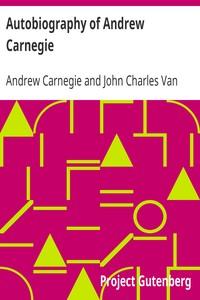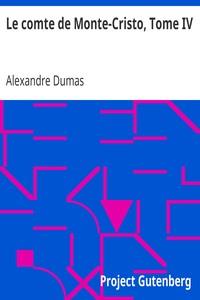|
|
Read this ebook for free! No credit card needed, absolutely nothing to pay.Words: 101106 in 39 pages
This is an ebook sharing website. You can read the uploaded ebooks for free here. No credit cards needed, nothing to pay. If you want to own a digital copy of the ebook, or want to read offline with your favorite ebook-reader, then you can choose to buy and download the ebook.

: Autobiography of Andrew Carnegie by Carnegie Andrew Van Dyke John Charles Editor - Carnegie Andrew 1835-1919; Industrialists United States Biography; Philanthropists United States Biography@FreeBooksTue 06 Jun, 2023 ts with most of them. The accounts were sometimes greatly overdrawn. The treasurer had accordingly to notify the confectioner, which he did in due form, that he would not be responsible for any debts contracted by the too hungry and greedy boys. Robert Pitcairn was the worst offender of all, apparently having not only one sweet tooth, but all his teeth of that character. He explained to me confidentially one day, when I scolded him, that he had live things in his stomach that gnawed his insides until fed upon sweets. COLONEL ANDERSON AND BOOKS With all their pleasures the messenger boys were hard worked. Every other evening they were required to be on duty until the office closed, and on these nights it was seldom that I reached home before eleven o'clock. On the alternating nights we were relieved at six. This did not leave much time for self-improvement, nor did the wants of the family leave any money to spend on books. There came, however, like a blessing from above, a means by which the treasures of literature were unfolded to me. Colonel James Anderson--I bless his name as I write--announced that he would open his library of four hundred volumes to boys, so that any young man could take out, each Saturday afternoon, a book which could be exchanged for another on the succeeding Saturday. My friend, Mr. Thomas N. Miller, reminded me recently that Colonel Anderson's books were first opened to "working boys," and the question arose whether messenger boys, clerks, and others, who did not work with their hands, were entitled to books. My first communication to the press was a note, written to the "Pittsburgh Dispatch," urging that we should not be excluded; that although we did not now work with our hands, some of us had done so, and that we were really working boys. Dear Colonel Anderson promptly enlarged the classification. So my first appearance as a public writer was a success. My dear friend, Tom Miller, one of the inner circle, lived near Colonel Anderson and introduced me to him, and in this way the windows were opened in the walls of my dungeon through which the light of knowledge streamed in. Every day's toil and even the long hours of night service were lightened by the book which I carried about with me and read in the intervals that could be snatched from duty. And the future was made bright by the thought that when Saturday came a new volume could be obtained. In this way I became familiar with Macaulay's essays and his history, and with Bancroft's "History of the United States," which I studied with more care than any other book I had then read. Lamb's essays were my special delight, but I had at this time no knowledge of the great master of all, Shakespeare, beyond the selected pieces in the school books. My taste for him I acquired a little later at the old Pittsburgh Theater. John Phipps, James R. Wilson, Thomas N. Miller, William Cowley--members of our circle--shared with me the invaluable privilege of the use of Colonel Anderson's library. Books which it would have been impossible for me to obtain elsewhere were, by his wise generosity, placed within my reach; and to him I owe a taste for literature which I would not exchange for all the millions that were ever amassed by man. Life would be quite intolerable without it. Nothing contributed so much to keep my companions and myself clear of low fellowship and bad habits as the beneficence of the good Colonel. Later, when fortune smiled upon me, one of my first duties was the erection of a monument to my benefactor. It stands in front of the Hall and Library in Diamond Square, which I presented to Allegheny, and bears this inscription: To Colonel James Anderson, Founder of Free Libraries in Western Pennsylvania. He opened his Library to working boys and upon Saturday afternoons acted as librarian, thus dedicating not only his books but himself to the noble work. This monument is erected in grateful remembrance by Andrew Carnegie, one of the "working boys" to whom were thus opened the precious treasures of knowledge and imagination through which youth may ascend. This is but a slight tribute and gives only a faint idea of the depth of gratitude which I feel for what he did for me and my companions. It was from my own early experience that I decided there was no use to which money could be applied so productive of good to boys and girls who have good within them and ability and ambition to develop it, as the founding of a public library in a community which is willing to support it as a municipal institution. I am sure that the future of those libraries I have been privileged to found will prove the correctness of this opinion. For if one boy in each library district, by having access to one of these libraries, is half as much benefited as I was by having access to Colonel Anderson's four hundred well-worn volumes, I shall consider they have not been established in vain. "As the twig is bent the tree's inclined." The treasures of the world which books contain were opened to me at the right moment. The fundamental advantage of a library is that it gives nothing for nothing. Youths must acquire knowledge themselves. There is no escape from this. It gave me great satisfaction to discover, many years later, that my father was one of the five weavers in Dunfermline who gathered together the few books they had and formed the first circulating library in that town. The history of that library is interesting. It grew, and was removed no less than seven times from place to place, the first move being made by the founders, who carried the books in their aprons and two coal scuttles from the hand-loom shop to the second resting-place. That my father was one of the founders of the first library in his native town, and that I have been fortunate enough to be the founder of the last one, is certainly to me one of the most interesting incidents of my life. I have said often, in public speeches, that I had never heard of a lineage for which I would exchange that of a library-founding weaver. I followed my father in library founding unknowingly--I am tempted almost to say providentially--and it has been a source of intense satisfaction to me. Such a father as mine was a guide to be followed--one of the sweetest, purest, and kindest natures I have ever known. I have stated that it was the theater which first stimulated my love for Shakespeare. In my messenger days the old Pittsburgh Theater was in its glory under the charge of Mr. Foster. His telegraphic business was done free, and the telegraph operators were given free admission to the theater in return. This privilege extended in some degree also to the messengers, who, I fear, sometimes withheld telegrams that arrived for him in the late afternoon until they could be presented at the door of the theater in the evening, with the timid request that the messenger might be allowed to slip upstairs to the second tier--a request which was always granted. The boys exchanged duties to give each the coveted entrance in turn. In this way I became acquainted with the world that lay behind the green curtain. The plays, generally, were of the spectacular order; without much literary merit, but well calculated to dazzle the eye of a youth of fifteen. Not only had I never seen anything so grand, but I had never seen anything of the kind. I had never been in a theater, or even a concert room, or seen any form of public amusement. It was much the same with "Davy" McCargo, "Harry" Oliver, and "Bob" Pitcairn. We all fell under the fascination of the footlights, and every opportunity to attend the theater was eagerly embraced. Free books android app tbrJar TBR JAR Read Free books online gutenberg More posts by @FreeBooks

: The World of Romance being Contributions to The Oxford and Cambridge Magazine 1856 by Morris William - Middle Ages Fiction; Tales Fantasy@FreeBooksTue 06 Jun, 2023
|
Terms of Use Stock Market News! © gutenberg.org.in2025 All Rights reserved.






